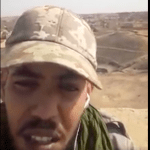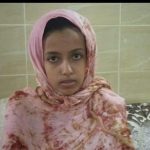
His Holiness Pope Francis,
The Italian movement of solidarity and friendship with the Sahrawi people and the Saharawi community in Italy, writes to you Holy Father to give a voice to those who have long been deprived of their rights: the Sahrawi people.
We turn to you, Your Holiness, Father of the Catholic Church and representative of the universal values of Peace and Brotherhood that must exist among peoples and lodge in the heart of every person, with the prayer that you may welcome our words.
We wish to witness what has been happening in the Western Sahara since 1975, the year in which Spain abandoned its only African colony. In that year the Sahrawi people were invaded by the Kingdom of Morocco and Mauritania in violation of the Sahrawi people’s right to self-determination, recognized by multiple UN resolutions since 1963. The invasion has its foundation in the appropriation of resources of the Western Sahara sea, one of the most plentiful in fishy in the world, and of mineral resources such as phosphates, used in the production of fertilizer for agriculture. The economic interests of these two invading countries were and remain connected with those of some European countries. After a short while Mauritania gave up all pretensions in 1979, leaving the occupation of the whole territory to the Kingdom of Morocco.
The war continued until the truce of 1991. In that year a Peace Plan was signed, under the aegis of the UN, between the Kingdom of Morocco and the Polisario Front, the recognized liberation movement of the Sahrawi people. The Peace Plan provided for the establishment of the MINURSO (United Nations Mission for the Referendum in Western Sahara), in charge of carrying out the referendum for self-determination which, to date, has not yet been called. The very serious fact should be noted that MINURSO is to date the only UN mission that has not been sent to ensure respect for human rights in the territories occupied by violence.
In 1975, with the invasion by Morocco, part of the Sahrawi population was forced to flee their homes, reaching the borders of southwestern Algeria, where they set up refugee camps where 173,600 people still live today. In exile, in the refugee camps, the Sahrawi government also resides, established in 1976 with the proclamation of the Sahrawi Arab Democratic Republic (SADR) now recognized by 30 countries, with a Constitution and democratically elected government bodies. In the camps, the population has the recognition of refugee status by the United Nations High Commissioner for Refugees (UNHCR) and has lived for over 45 years in precarious and harsh living conditions: The Sahara desert is hot and sterile; the inhabitants live in tents and in small earthen brick houses, to shelter from the prohibitive climatic conditions; drinking water is in short supply; food is totally dependent on international humanitarian aid. The Sahrawi people survive with great dignity and strive to guarantee basic education and primary care thanks to international institutions such as UNHCR, WFP, UNICEF, the European Union and the solidarity of numerous NGOs and associations of international volunteering, small and large. Meanwhile, the Kingdom of Morocco has been able to consolidate its illegal presence in the territory of Western Sahara, and since the 1980s, it has built a 2700 km long wall, mined and controlled militarily by the army, to protect the economically interesting areas it exploits without having any right to do so.
This wall, renamed “Wall of Shame”, also divides the population which still today sees thousands of families divided between the occupied territory and the refugee camps. The Sahrawis who live in the Moroccan-occupied part of Western Sahara are deprived of the fundamental freedoms to which every person is naturally entitled: they do not enjoy legal protection, suffer persecution, arbitrary detention, torture, discrimination in employment and in access to health and education services. . The Moroccan occupation is imposed with repression, the use of military force and abuses, also documented by humanitarian associations such as Amnesty International. In Moroccan territory, 50 Sahrawi political prisoners or 50 violated human rights defenders are being held, 9 of whom have been sentenced to life imprisonment after having undergone unfair trials.
After this brief summary of the history of an oppressed people, recent events have greatly strengthened the urgency and need to bring the human condition of the Sahrawi people to the attention of His Holiness.
The border area between the Western Sahara and Mauritania called “El Guerguerat” is an area under the control of the Polisario Front (part of the so-called liberated zone), limited by the wall built by Morocco in the 1980s and considered by MINURSO as a limit impassable for the maintenance of the ceasefire.
On 21 October 2020. A group of Sahrawi civilians started a protest in El Guerguerat by obstructing the passage of Moroccan transport vehicles carrying the economic resources plundered from Western Sahara, through a breach in the border wall of the ceasefire.
On November 13, the Moroccan army intervened militarily with violence to disperse the demonstrators, breaking the ceasefire. After 29 years of truce, the war has resumed.
The Sahrawi people have always and with determination firmly believe in the inestimable value of Peace and yearn to live in a climate of brotherhood, freedom, peace and beauty, based on respect for legality, international law and loyalty. For 45 years he practiced dialogue and diplomacy with conviction, paying for the delays and defaults of the international community, blocked by political convenience.
We turn to you, Your Holiness, asking for your intercession and support in giving voice to our common cause of Hope and Justice.
We send you our warmest greetings with infinite respect and brotherhood.
“There is hope for your future: your children will return to their borders” (Jer. 31,17)
Il Presidente Rete Saharawi Od
Ivan Lisanti






